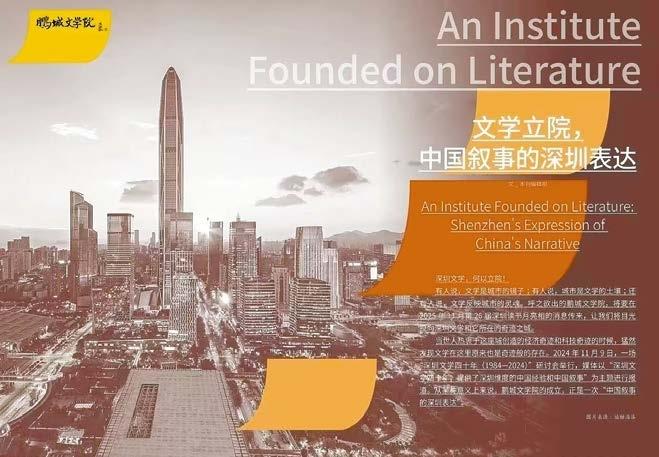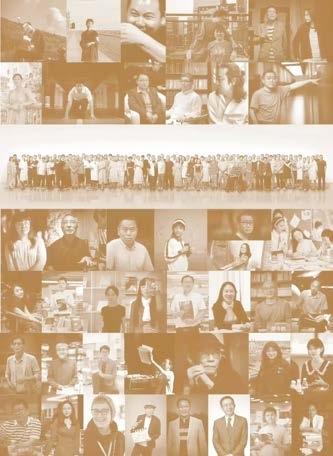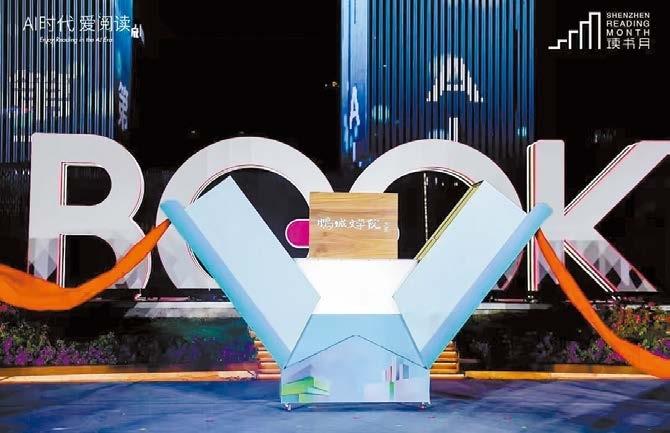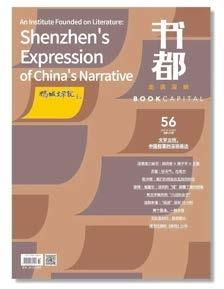



THE Pengcheng Literary Institute, designed as a creative hub supporting the development of books, films, animation, and games, was unveiled Sunday evening at the opening ceremony of the 26th Shenzhen Reading Month. This new platform aims to produce more local stories for both national and international audiences. Ahead of the founding of the Pengcheng Literary Institute, Book Capital, a magazine of the Shenzhen Publishing Group, devotes its latest issue to tracing 45 years of Shenzhen literature. The special feature, “An Institute Founded on Literature: Shenzhen’s Expression of China’s Narrative,” examines how a young, rapidly changing city shaped a distinctive literary voice — and why a civic literary institute matters now. Why and how to found a literary institute in SZ Why does Shenzhen choose this time to found a literary institute? What kind of literary institute does the city need? The first question finds its answer in the character of Shenzhen literature; the second, in the reflections of leading writers from different perspectives. “Shenzhen is a crucial window for the world to observe China’s reform and opening-up, and an equally important one for China to showcase its achievements to the world,” said Tang Hanlong, chairman of Shenzhen Publishing Group. How should that observation be made? How should the story be told? Tang argues literature is an essential mirror. Timed with Shenzhen’s 45th anniversary, the Pengcheng Literary Institute carries a national mission: to raise the profile of Shenzhen literature abroad and, more importantly, to turn Shenzhen’s stories into stories of the world. To consider what kind of institute Shenzhen needs, Book Capital invited established writers Li Jingze and A Lai; Hong Kong and Macao cultural scholars Wu Zhiliang and You Jiang; and younger writers Cai Chongda, Cai Dong, Chen Qiufan, and Hai Ya to engage in a multidimensional dialogue about the institute’s values and aims. A 40,000-word chronicle of a city’s literary development In preparation for the institute, Shenzhen Publishing Group commissioned a comprehensive survey of Shenzhen literature. Liao Lingpeng’s 40,000-word report, “An Atypical Chronicle of the 45-Year Growth of Shenzhen Literature,” reviews the field’s evolution, the relationship between writers and the city, the platforms and ecosystems shaping literary expression, and Shenzhen literature’s international presence. It highlights the literary energy that has propelled citizens — an energy that converts collective action into cultural spirit. The 45th anniversary of the Shenzhen Special Economic Zone is a brilliant interpretation on a blank canvas by its people; Shenzhen literature is another layer of that interpretation. Reform and opening-up, and the rise of a new city, provide the historical context; the pioneering spirit and inclusiveness form its ethical core. Over the decades, Shenzhen’s writers have followed the city’s pulse, producing narratives that capture the many lives and possibilities here. As Chinese President Xi Jinping observed at the 2014 Forum on Literature and Art, the people are both creators and witnesses of history — the development of Shenzhen literature is, fundamentally, a record of people writing about their lives. How far is Shenzhen from becoming a 'city of literature' Shenzhen’s literary development is closely interwoven with the city’s cultural ecology. Today Shenzhen literature is in a phase of flourishing vitality. From the industrial experiment of “Literature+” to the aspiration to be acknowledged as a “city of literature,” Shenzhen’s literary future looks promising. The “Shenzhen Literature+” phenomenon — blending literature with games, film, theater, animation, technology, design, and other industries — represents a distinctive cultural landscape and an unprecedented industrial experiment. These cross-disciplinary explorations offer useful models for the innovative development of contemporary Chinese literature. As a young immigrant city known for openness, inclusiveness, and innovation, Shenzhen gathers talent from across the country and unleashes strong cultural energy. Continuous creativity and imagination have created fertile ground for literary production, making Shenzhen a plausible candidate to earn the title of “city of literature.” While the world marvels at Shenzhen’s economic and technological achievements, Book Capital encourages a look back at the roots and future of its literature — another kind of local miracle. In this sense, the founding of the Pengcheng Literary Institute embodies a Shenzhen-shaped expression of China’s broader narrative. About Book Capital Book Capital is a public-interest cultural magazine supervised by Shenzhen Publishing Group and published by Shenzhen Publishing House. Guided by the principles of being pragmatic, forward-looking, and thoughtful, the magazine aims to be a cultural handbook for the city — exploring Shenzhen’s cultural meanings, highlighting its richness, and guiding readers from books into deeper engagement with the city itself.(SD News) | 
